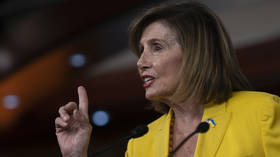RT explores why Pelosi’s Taiwan visit is a big deal

US officials have been downplaying the significance of the possible visit to Taiwan by House Speaker Nancy Pelosi, alleging that China is overreacting. But from Beijing’s standpoint it’s a really big deal, as it exemplifies what they see as Washington’s erosion of the status quo that has existed for over four decades.
Pelosi, who is leading a congressional delegation on an Asian-Pacific trip this week, may spend a night in Taipei and meet Taiwan’s leader, Tsai Ing-wen, according to media reports. Beijing repeatedly warned against the possible visit, saying it would deal a major blow to relations between the nations.
RT’s Caleb Maupin probed why the views of China and America are so different.
Senior US officials preemptively blamed China for any possible conflict, arguing that Pelosi was not doing anything extraordinary.
“If the Speaker does decide to visit, and China tries to create some kind of crisis or otherwise escalate tensions, that would be entirely on Beijing,” US Secretary of State Antony Blinken stated.
Chinese officials treat Pelosi’s possible stop in Taiwan as an affront to its sovereignty. Beijing considers the island, which has been self-ruled since the Chinese civil war of the 1940s, as part of the nation of China, yet to be peacefully integrated with the mainland.
The US has acknowledged that there is only ‘One China’ since the 1970s and switched its diplomatic recognition from Taipei to Beijing in 1979, but maintained informal ties with the island.
The White House has distanced itself from Pelosi’s travel plans, saying the speaker was free to take such decisions regardless of what the executive branch wants.
But the Chinese government may well take it as an element of a wider hostile policy towards Beijing, Benjamin Chiao, a professor at the Paris School of Technology and Business, told RT.
“US policy right now is playing with fire,” he said, adding that within the last two years it “has been doing everything up to the point of violating or clearly rejecting the One China policy.”
As a recent example of the US treating Taiwan as a sovereign nation, Chiao recalled that Washington “invited Taiwan to the Summit of Democracies last year, which the Chinese side has repeatedly warned against.”
According to the analyst, Washington seems to be forcing China to concede in trade deals and its position on the Russia-Ukraine conflict. But, he added, China has not conceded and the US has had little option left but “to escalate the matter further.”
In recent years, the diplomatic, economic and military support that Taipei gets from Washington has been growing as the US ramped up its so-called great powers competition against China.
In May, President Joe Biden explicitly pledged to use the US military to defend Taiwan, which China took as a significant escalation. In June, a new bill was introduced in the US Congress which critics say would all but nullify the One China policy.
“The United States is hollowing out and blurring up the ‘One China’ policy,” Chinese representative to the US Qin Gang asserted last month during an Aspen Security Forum appearance. The principle is “the political foundation for China-US relations” and “the bedrock for peace and stability across the Taiwan Strait as well” he stressed.
US officials claim their commitment to the ‘One China’ policy is as strong as ever, but Beijing argues that American actions are tacitly encouraging Taiwan to declare its formal independence.













